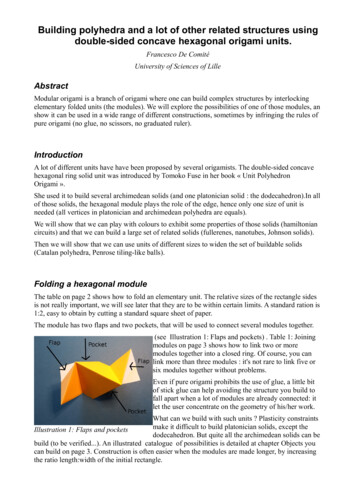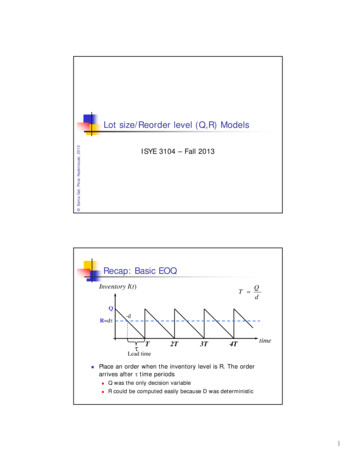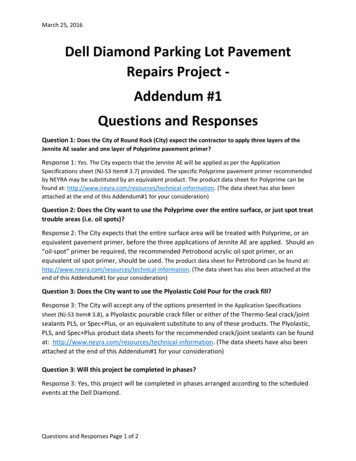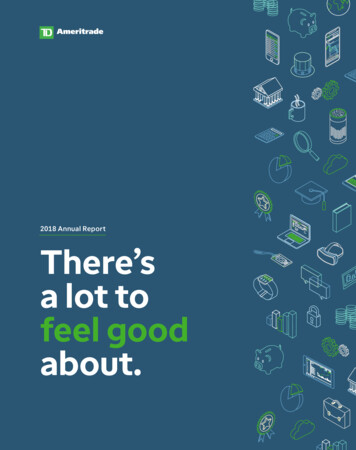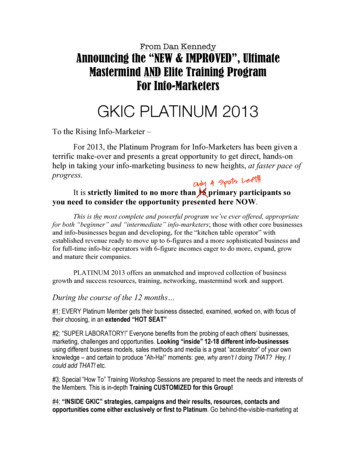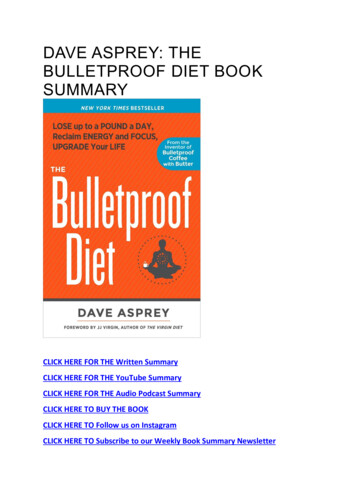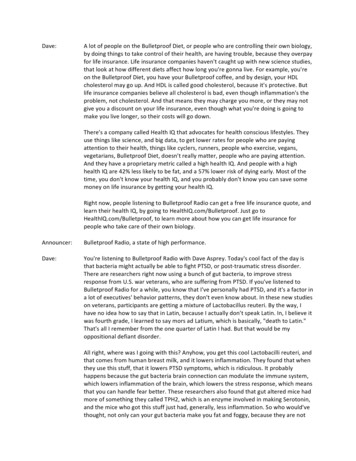
Transcription
Dave:A lot of people on the Bulletproof Diet, or people who are controlling their own biology,by doing things to take control of their health, are having trouble, because they overpayfor life insurance. Life insurance companies haven't caught up with new science studies,that look at how different diets affect how long you're gonna live. For example, you'reon the Bulletproof Diet, you have your Bulletproof coffee, and by design, your HDLcholesterol may go up. And HDL is called good cholesterol, because it's protective. Butlife insurance companies believe all cholesterol is bad, even though inflammation's theproblem, not cholesterol. And that means they may charge you more, or they may notgive you a discount on your life insurance, even though what you're doing is going tomake you live longer, so their costs will go down.There's a company called Health IQ that advocates for health conscious lifestyles. Theyuse things like science, and big data, to get lower rates for people who are payingattention to their health, things like cyclers, runners, people who exercise, vegans,vegetarians, Bulletproof Diet, doesn't really matter, people who are paying attention.And they have a proprietary metric called a high health IQ. And people with a highhealth IQ are 42% less likely to be fat, and a 57% lower risk of dying early. Most of thetime, you don't know your health IQ, and you probably don't know you can save somemoney on life insurance by getting your health IQ.Right now, people listening to Bulletproof Radio can get a free life insurance quote, andlearn their health IQ, by going to HealthIQ.com/Bulletproof. Just go toHealthIQ.com/Bulletproof, to learn more about how you can get life insurance forpeople who take care of their own biology.Announcer:Bulletproof Radio, a state of high performance.Dave:You're listening to Bulletproof Radio with Dave Asprey. Today's cool fact of the day isthat bacteria might actually be able to fight PTSD, or post-traumatic stress disorder.There are researchers right now using a bunch of gut bacteria, to improve stressresponse from U.S. war veterans, who are suffering from PTSD. If you've listened toBulletproof Radio for a while, you know that I've personally had PTSD, and it's a factor ina lot of executives' behavior patterns, they don't even know about. In these new studieson veterans, participants are getting a mixture of Lactobacillus reuteri. By the way, Ihave no idea how to say that in Latin, because I actually don't speak Latin. In, I believe itwas fourth grade, I learned to say mors ad Latium, which is basically, "death to Latin."That's all I remember from the one quarter of Latin I had. But that would be myoppositional defiant disorder.All right, where was I going with this? Anyhow, you get this cool Lactobacilli reuteri, andthat comes from human breast milk, and it lowers inflammation. They found that whenthey use this stuff, that it lowers PTSD symptoms, which is ridiculous. It probablyhappens because the gut bacteria brain connection can modulate the immune system,which lowers inflammation of the brain, which lowers the stress response, which meansthat you can handle fear better. These researchers also found that gut altered mice hadmore of something they called TPH2, which is an enzyme involved in making Serotonin,and the mice who got this stuff just had, generally, less inflammation. So who would'vethought, not only can your gut bacteria make you fat and foggy, because they are not
working in your interest, they're working in their best interest. You just want to makesure that's all aligned, and get rid of the little bastards who don't belong there, andmake sure the ones who are there behave themselves. At least that's just my advice toyou. But who knows, they could do even more for your brain.All right. Let's talk about a couple cool things before we get into the show. Number one,have you tried Bulletproof collagen protein? This is an amazing product, something I'vebeen using in my Bulletproof coffee for a very long time, something I wrote about inboth books, and something that's probably missing from your diet, unless you dress in aburlap sack, and make bone broth, which takes approximately 24 hours of boiling bones,where you stir them, preferably with your hair in a man bun. Okay, I'm just kidding. Butyou know what I'm saying? I actually do make bone broth at home, so I'm only makingfun of myself, and my lack of a man bun. But it is a big commitment, and most of us arejust too busy, and you don't get much collagen in bone broth anyway. You do getminerals.What I do is I use the Bulletproof grass fed collagen protein, to get the amino acids thatare present there, that are building blocks for bone, and skin, and joints. And peoplealways say, "Dave, how come your skin looks so good?" And, well, I did take skin cellsfrom my butt, and put them on my face, so I'm a butt-face. That could be part of it,because I have nice skin on my butt. But on top of that, it also could just be that I takean enormous amount of Bulletproof collagen, and I have for many years. I think that'spart of why this all works.The other thing you might notice, if you're watching on YouTube. By the way, I alwaysdo cool stuff on video. There's like, cool bio moderating stuff behind me, and whateverelse. But you can go to Bulletproof.com/YouTube, to get a direct link to the YouTubechannel, because I'm wearing some cook glasses here. These are the new, metal frame,high end, Bulletproof . Sorry, these aren't Bulletproof. The new high end Biohacked,they're called True Dark glasses. These are the Daywalkers. This is one of the companiesthat I'm backing, and I helped them to get launched. This company makes glasses thatblock half of the blue light during the day, which causes your brain to relax, but doesn'tcompletely eliminate the, so you don't have to walk around with those dark orangeglasses, like I'm famous for wearing like, ten years ago, the blue blockers.But what absolutely rocks my world is that they come in a set. You get the ones youwear during the day. They give you some blue light, but not too much. And then, youput on the night glasses. These are called the Twilights. And then, you look pretty muchlike a superhero. These are optical, patented filters, that filter out every spectrum oflight that affects what's called the melanopsin center in your brain. Your mitochondriaare deciding whether it's day or night. When you wear these glasses, the mitochondriain the eyes and your brain, are convinced that it's pitch black. So they act like noisecanceling headphones for your eyes. You literally just chill out when you put them on.And when I wear them for an hour or two before bed, I double my deep sleep, on anaverage night. It's completely transformed my ability to sleep, and I'm immune from jetlag, even when I fly to Europe, even when I fly from Dubai and back in just a few days.It's completely, completely amazed me that they're this effective.
You can go to Biohacked.com. That's B-I-O-H-A-C-K-E-D .com, and the glasses are calledTrue Dark. They are an amazing biohack. It's like, just a one time thing, and you wearthem. More energy all day long, from blocking some of the blue, but you get enough ofa signal to tell yourself that It's daytime, and you look pretty good, if you see this onvideo. Like, these are not crazy [inaudible] glasses. And the nighttime glasses will rockyour sleep, like you've never seen.All right, let's get into the show today. Today's guest is Dr. Jolene Brighton, and she's anexpert in hormone balance, thyroid, and a functional medicine leader. And I met herthrough JJ Virgin, a mutual friend of ours. And what's interesting about Dr. Jolene, isthat she's trained in naturopathic medicine, but also in biochemistry, so she goes a littlebit deeper than you're likely to find. And she wrote a book called, healing your bodynaturally after childbirth, the new mom's guide to navigating the fourth trimester. Andshe's not on just to talk about that. We're going to talk about birth control We're goingto talk about the pill. And I've been an outspoken advocate of not using the pill on theBulletproof blog, since the very beginning of this, and there's very specific reasons.Mostly that I like women, and the pill is bad for women. I'm just saying it.So Dr. Jolene's gonna help us understand that. And on top of that, we're going to talkabout just general hormone problems, differences between men and women,nutritionally, and we'll get to some other cool stuff like traumatic brain injury. So this isgonna be a fascinating interview today, and I'm happy that you're here to listen to it. Dr.Jolene Brighton, thanks for coming on Bulletproof Radio.Jolene:Yeah. Thanks so much for having me. I'm, I've been a big time fan, for a long time, sothis is really exciting, to get to come on here and chat with you, and to be chatting aboutall the biohacking stuff, that you've been preaching about forever, that the research isfinally catching up with, I feel like, and how we can apply that to just modern daysociety, and what we're seeing in people's health.Dave:It's kind of funny. When I surveyed the Bulletproof listener base, and we've got about 50million downloads, give or take, on Bulletproof Radio now. There are a lot of womenthat listen to the show, and a surprising number of people, at least surprising if youdon't have kids, is people who have kids, like I do. Mine are around ten and seven. Andeveryone who hasn't had kids, doesn't know what's coming, from a woman'sperspective. You're like, "Oh, I'm pregnant," and like, "Okay, maybe I threw up. Maybe Ididn't." And you go through this stuff. My first book being about fertility, like whenyou're in alignment, all of that. But my book sort of ended at "Here's how to makeformula if you're not making milk." And here's to have a good birth. Good luck with that.And then you're like, "Okay, here's what's going to happen."So, let's go in, given that so many of us either have kids, or are having kids, or are goingto have kids, whether you are a man or a woman, this is stuff you need to hear. Wewon't go too deep on that. We've only got an hour, and we've got a couple other topics.But what happens in a woman's body, after the baby comes out?Jolene:Yeah. So this is not something . We should just acknowledge that society's not talkingabout this a lot. Once upon a time, we mothered in tribes. There was a wise woman, she
guided us through all of this. And there was what was called the fourth trimester. So Icall the fourth trimester the first three months after you've had that baby. Everyone'sfocus is on baby. So once baby's delivered, mom gets the six week checkup. "Hey, yourvagina's looking okay. No signs of infection. Fantastic. Go upon your way." And whenyou're tired, you're exhausted, you start having symptoms come up, you're met with thediagnosis of being a mother, or a father. We see this happens a lot too with men, wheredoctors will just say, "Well, you've had kids, so of course you feel that way." And inreality, when you go through childbirth . I mean, that's probably the most strenuousathletic event a woman's body will ever go through.And if we really stand back and reframe this. If you were to run a marathon, forinstance, or do an iron man, everyone would hold space for you to recover, and be like,"Oh, of course you have to recover from that." But for some reason, somewhere alongthe line, we got it in our head, that women should be able to pop out a baby, and thenjust go along their merry way, and at six weeks, everything's recovered and fine. Theonly thing that's recovered at six weeks is the size of your uterus, so that has shrunk.And that's what gave medical doctors this profound idea, that, "Oh, okay. It took youten months for your body to grow this human, so you should be able to recover it in sixweeks," which leaves a lot of women questioning, "Well, what's wrong with me?"Reality is that it takes a whole year to really rebuild the nutrients, and recalibrate ourbody.Dave:Now, when Lana, my wife, who's a medical doctor, and co-author of the fertility book.When she, or so when we had kids, I caught both of the kids at home. So I say, we hadthem. And, afterwards, she described this mommy brain. And I . Actually, it pisses Lanaoff when I say this, but that means I can say it. She's not in the room.Jolene:It pisses every mom off. They hate that word.Dave:Well the thing is, she's actually smarter than I am, but once we had the kids, she's like,"My brain doesn't work." She's like, "I have mommy brain. Like, what's going on here?"And I have a good friend right now, who's a CEO, and she just had a baby. And she'strying to go back to work at six weeks, and she's like-Jolene:Oh yes.Dave:"I don't know how to do what I could do before." What's going on there?Jolene:Yeah. So that's a great one. Okay, so your brain does shrink during the third trimester,and it doesn't come back until about six months postpartum. This is evolution beingsuper, super smart. And what's the whole premise behind this? It gets you hyperfocused on baby. You cannot multitask. You can only focus on baby's survival. However,we live in a society that demands multi-tasking. If you're hearing this, and you'refreaking out, about your brain, just know that the research shows that moms actually,their brains come back, and if you tend to them, they actually come back stronger. Soyou're better at multi-tasking. Your corpus callosum, so both sides, both sides of thebrain, are actually connected and talking better. But there's another layer to all of this,
and that is, when you deliver your baby, what follows is a placenta. And when youdeliver the placenta, your hormones instantly drop to the level of a postmenopausalwoman. And we know post-menopausal women have lots of brain fog. Estrogen levelsare off. Progesterone levels are off. And couple that with the fact that mama's notusually sleeping. And so, maybe it's only thre
vegetarians, Bulletproof Diet, doesn't really matter, people who are paying attention. And they have a proprietary metric called a high health IQ. And people with a high health IQ are 42% less likely to be fat, and a 57% lower risk of dying early. Most of the time, you don't know your health IQ, and you probably don't know you can save some





